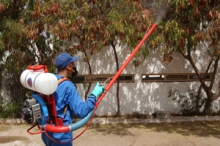Extraordinary UN conference takes historic strides to strengthen chemical safety globally

Increase the political priority accorded to sound management of chemicals and waste.
11 May 2013, Geneva - The three conventions that govern chemicals and hazardous waste safety at the global level concluded their first ever jointly held meetings of the parties late Friday night in Geneva. The historic meeting, attended by nearly two thousand participants from 170 countries, as well as 80 Ministers, adopted 50 separate decisions aimed at strengthening protection against hazardous chemicals and waste.
The three legally autonomous conventions had convened the joint meeting of the conferences of the parties to strengthen cooperation and collaboration between the conventions, with a view to enhancing the effectiveness of their activities on the ground. Each convention then continued individually over the two-week period to deal with its own specific topics of the global chemicals and waste agenda before returning in a joint session at the end of the week to finalize their outcomes.
The meeting culminated in a ministerial segment on 9 and 10 May 2013 dedicated to the theme of strengthening synergies between the conventions at national, regional and global level. The ministerial segment was joined by Swiss Federal Councillor Doris Leuthard, United Nations Environment Programme (UNEP) Executive Director Achim Steiner, Food and Agriculture Organization of the United Nations (FAO) Director-General José Graziano da Silva, and Global Environment Facility (GEF) CEO and Chairperson Naoko Ishii.
The global agency leaders pledged to deepen cooperation and collaboration as part of a broader effort to raise the profile of chemicals and waste issues, promote green growth and alleviate poverty.
At its conclusion, the joint meeting acclaimed the “Geneva Statement on the Sound Management of Chemicals and Waste”. The Geneva Statement welcomed the UNEP-led consultative process on financing options for chemicals and waste that has considered the need for heightened efforts to increase the political priority accorded to sound management of chemicals and waste.
In a press conference following the ministerial segment, Mr. Steiner called the conferences of the parties “a unique historic event coming at a time of unprecedented change and progress in the arena of global environmental governance. The strengthening of UNEP and the synergies process of chemicals and waste multilateral environmental agreements are complementary parts of the ongoing reform to fortify the environmental dimension of sustainable development.”
Ms. Ishii spoke of the challenges countries face protecting the planet's critical ecosystems from contamination by hazardous chemicals and waste and of GEF support for strategies to overcome them. “At this critical juncture, the Global Environment Facility is committed to its financial support to help countries address these important challenges in three ways,” said Ms. Ishii. “Assisting them in their efforts to mainstream sound chemicals management in national agendas, creating an integrated GEF chemicals and wastes focal area, and expanding engagement with the private sector.”
FAO Director-General José Graziano da Silva said that in many countries intensive crop production has depleted agriculture’s natural resource base, jeopardizing future productivity. “To fight hunger and eradicate poverty, we will need to find more sustainable ways to produce 60 percent more food by 2050,” he said. However, he recognized that chemical pesticides would continue to be part of farming in many parts of the world in future.“The challenge is to enable countries to manage pesticides safely, to use the right quantity, at the right time and in the right way and also to apply alternatives to hazardous pesticides. Because when we don’t, pesticides continue to pose a serious risk to human health and the environment and will eventually end up as waste. Today, half a million tons of obsolete pesticides are scattered around the developing world,” he said.
“Around 70 percent of the chemicals addressed by the Basel, Rotterdam and Stockholm conventions are pesticides, and many are used in agriculture. It is in the best interest of all countries to ensure that the Basel, Rotterdam and Stockholm conventions can work together, effectively and efficiently, to address various aspects of the chemical life cycle.”
The joint meetings of the conferences of the parties to the Basel, Rotterdam and Stockholm conventions also reviewed the impact of the arrangements put in place by governments in 2011 to strengthen synergies among the treaties.
The parties endorsed the organization of the Secretariat, and adopted a programme of work and budget individual and for joint activities of three conventions in 2014-2015. ”The parties have agreed to strengthen capacity building and technical assistance for countries by investing the savings realized over the past two years into an enhanced technical assistance programme that better meets the needs of developing countries and countries with economies in transition” said Jim Willis, Executive Secretary of the Basel, Rotterdam and Stockholm conventions. “In an era of financial austerity, we have learned through synergies how to deliver more to parties while living within the economic limits faced by Governments today.”
“Much of the success of this synergies meeting is owed to the outstanding cooperation and inspired leadership of the three presidents of the conferences, Franz Perrez of Switzerland, Magdalena Balicka of Poland and Osvaldo Álvarez-Pérez of Chile,” added Mr. Willis.
The 6th meeting of the Conference of the Parties to the Stockholm Convention agreed to list hexabromocyclododecane (HBCD) to Annex A to the Convention with specific exemptions for expanded polystyrene and extruded polystyrene in buildings. Efforts to adopt a non-compliance mechanism, however, did not succeed in the face of continuing disagreement on how such a mechanism might function.
Basel Convention's parties, at their 11th Conference of the Parties, took decisions to strengthen compliance with the Convention. The Parties adopted a framework for the environmentally sound management of hazardous wastes and other wastes, and agreed, over the next two years, to develop technical guidelines on transboundary movements of electronic and electrical wastes (e-waste).
